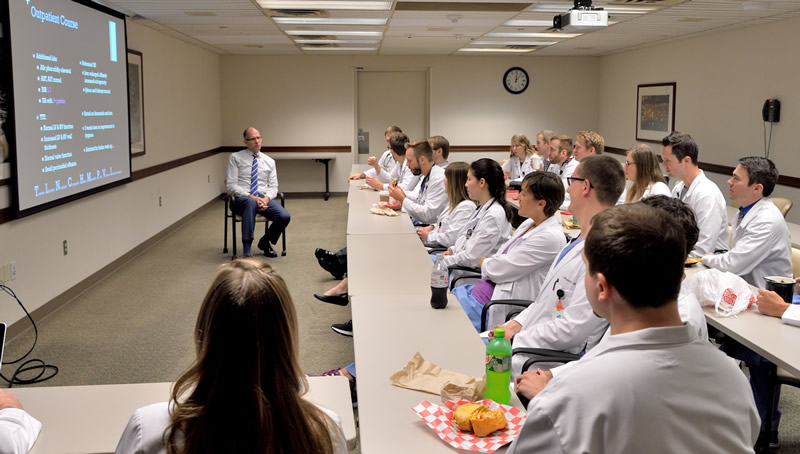Conferences and Education Resources
- Our comprehensive formal education program provides a specific, organized, annual curriculum that ensures our different formal conference activities are fully coordinated with minimal duplication and maximum coverage of over 300 annual core topics in internal medicine. In an average week, there are 6 resident conferences.
- The noon conference each day includes a Specialty Conference Series and covers 80 key topics from our curriculum (2 per week).
- Medicine Grand Rounds is a formal sequential discussion of an exremely educational patient case that focuses particularly on the way experts solve clinical problems (1 per week).
- Patient Case Conference is an in-depth discussion of a Residents' Service patient that covers an additional 150 topics in our curriculum. A Mortality/Morbidity conference and an Autopsy conference are part of this curriculum.
- Bedside Diagnosis Curriculum covers interviewing, physical examination and approach to medical diagnosis.
- Journal Club reviews current medical literature and presents a formal curriculum covering critical appraisal of clinical literature, use of diagnostic data, and making decisions under uncertainty.
- IMBUS Case Conference is our Internal Medicine Bedside Ultrasound conference that serves as part of our ultrasound quality assurance process as well as a fun image and case review session for our residents and faculty.
- G3 Seminar covers an important group of socioeconomic topics to give residents nearing completion of the program the skills and knowledge needed to participate in the health care system (1 per month).
- Outpatient Clinic Tutorials is a series of 48 topics, with a particular focus on outpatient procedural skills that is presented at the beginning of clinic sessions. (4 topics per month).
- A year-long professionalism curriculum for the G1 resident group.
- An average G1 is able to attend at least 75% of all conference activities. In addition, all of the major conference presentations are available on-line for viewing by residents who were unable to attend the conference or who wish to review the topic again.
Digital Technology in our Conferences
Live interaction with our electronic medical record and digital imaging (including our residency ultrasound image database) is used during attending rounds and most of the other regular resident conferences. This allows for advanced multimedia conferences and adds the ability to use our iPhone-integrated audience feedback system during case presentations. This allows for a dynamic interaction between the presenter and residents that improves learning.
Library Resources
The hospital's Medical Library offers an outstanding range of services. Extensive web-based resources also are available for all residents and faculty directly through the electronic medical record. Residents have free and unlimited access to photocopying both in the Medical Education office and in the main library.
Evaluation, Feedback and Communication
Residents are evaluated by their peers, students, Chief Residents and faculty. They also are formally evaluated in clinical skill areas including bedside medicine knowledge and technique, ECG interpretation, procedural skills, and critical appraisal knowledge. All G2s take the in-training exam offered by the ACP. Residents discuss their performance at private semiannual meetings with the Program Director. Each resident also has a faculty advisor who helps with resident feedback and evaluation as well as the resident's scholarly project(s). A Residency Council (joint resident and faculty participation) helps deal with any performance issues of residents or faculty and with the overall design and execution of the program. This committee also helps insure that residency policies meet ABIM requirements and are fairly enforced.


